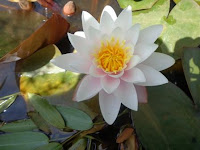In memory of
I
had a uncle who was a very wise man. I called him Uncle Dick, because he was my
uncle and he was called … Dick.
Uncle
Dick was a truck driver, and I know that he had limited formal education, but
he was very wise. You know, most of the so-called learned people I’ve met in my
life---and I’ve spent much of my life working with academics and in
academia---are little more than educated idiots. I guess I have to include
myself in that category. Back to my Uncle Dick. He was wise. He used to say to
me, ‘Jonesy, you never go [that is, die] before your time.’ He would say that
whenever someone died or whenever the subject of death was being discussed. ‘You
never go before your time,’ he would say.
It
took me years to understand what my uncle meant until one day a priest friend
of mine told me that his mother used to say, ‘Whatever is, is best.’ I had
heard that statement before, and even then I was aware of a poem by Ella Wheeler Wilcox [pictured left] entitled ‘Whatever Is—Is Best’ …
Sometimes by the heart's unrest,
And to grow means often to suffer --
But whatever is -- is best.
There
is a Zen kōan
called ‘Everything is best’, and it goes like this. When Banzan was walking
through a market he overheard a conversation between a butcher and his
customer. ‘Give me the best piece of meat you have,’ said the customer. ‘Everything
in my shop is the best,’ replied the butcher. ‘You cannot find here any piece
of meat that is not the best.’ At these words Banzan became enlightened.
Everything
is best, not necessarily because whatever is, is good, but because whatever is,
is what is. Our problems only happen when we resist whatever is, when we fight
against whatever is. If we can accept what is---as being our present reality---the
problems caused by non-resistance vanish. Now, that doesn’t mean we should not
seek to change things for the better. We must fight against injustice, cruelty,
oppression and discrimination. However, when it comes to that which truly
cannot be changed, acceptance is the way to go. Whatever we resist, persists. Listen to these wonderful words from the ‘Big Book’
of Alcoholics
Anonymous:
And acceptance is the answer to all my problems today.
When I am disturbed, it is because I find some person, place, thing or
situation---some fact of my life---unacceptable to me, and I can find no
serenity until I accept that person, place, thing or situation as being exactly
the way it is supposed to be at this moment.
These days, I have a bit of a problem with those words 'exactly the way it is supposed to be'. I would prefer to say, 'exactly the way it is'. Be that as it may, the point being made about the need for acceptance and non-resistance is a very valid one.
Now,
back to my uncle, who said, ‘You never go before your time.’ Well, whenever a
person goes---that is, dies---that is their time to go. Now, don’t get me
wrong. I don't believe in predestination or anything like that. I am simply
saying that a person cannot die earlier than when they actually do die. Some
people live a long life while others die young. There is a certain injustice in
that at times, but the point is that none of those people died before their
time to die. Some may retort, ‘But, surely when someone is murdered, they die
before their time?’ Really? Whenever you die is the time that you die. You cannot die before you die. The
difficulty some have with accepting the truth of this statement shows the
extent of our non-resistance to this self-evident truth.
Whatever
is, is best. Everything in my shop is the best. You never die before your time.
Life
is what it is. Accept it and move on. Death is what it is. Accept it and move
on.




















